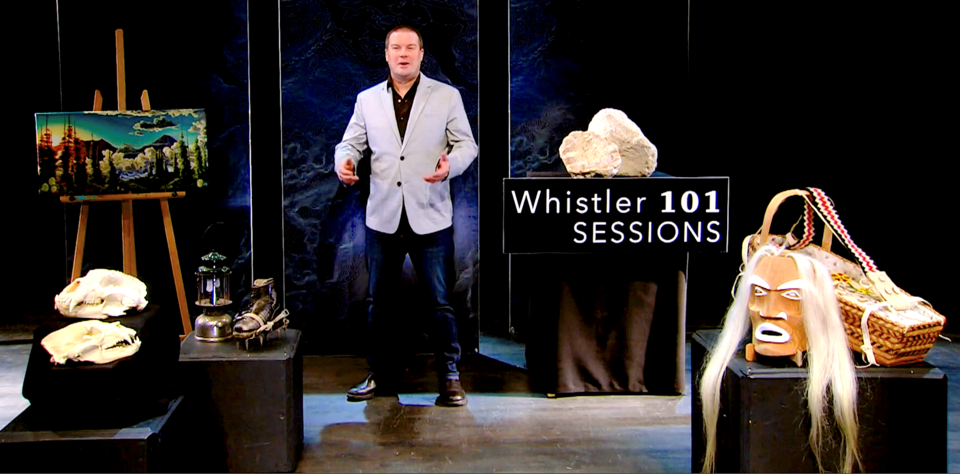Even after more than three decades in the Whistler Valley, working on Whistler 101—a new Resort Municipality of Whistler (RMOW) web series launching this month—was an education for filmmaker Mike Douglas.
“It’s super interesting. I’ve learned so much about this area that I didn’t know,” Douglas said.
Reached by phone while putting the finishing touches on the series’ first episode, which tackles the region’s geodiversity and launches online Dec. 16, Douglas’ enthusiasm for the project was evident as he listed four revelations from the first episode alone.
“You’ve probably heard how Black Tusk was formed—it was a volcano, like a traditional volcano, and it wore away and left a magma core …,” Douglas said. “And that’s totally not the case.”
The real Black Tusk origin story is a new interpretation, said biologist (and Pique columnist) Leslie Anthony, script supervisor and director of Whistler 101.
“I think the old theory was, ‘Well obviously that was a large stratovolcano, and it all eroded away and all that’s left is the plug that’s in the middle,’” Anthony said.
“Well, no, there was never a stratovolcano, there was a bunch of lava erupting under a glacier, and it never made it to the surface, and that’s what it ended up looking like as it collided against the ice.
“So that’s cool stuff.”
Without giving away too much, the five-part series is peppered with these little revelations, Anthony said.
“People should tune in because they’re going to find out something that they didn’t know about either the place that they live or the place they love to visit, and it’s going to make them love it even more, regardless,” he said.
“It’s going to present people with a fun rabbit hole, in many cases, if they want to go down it, and they’re not going to get overburdened either. That’s the best part.”
But Whistler 101 in its current form was far from a straightforward endeavour.
Originally envisioned as a series of in-person events at the Maury Young Arts Centre (think a Whistler-centric TED Talk), Whistler 101 was set to launch in April of this year, said project lead and RMOW manager of cultural planning and development John Rae.
“We were one day away from approving the advertising that would go in Pique newspapers to be creating awareness of the live lectures” when COVID shut down the resort, effectively shelving the project, Rae said.
At first, the lockdown had a deflating effect on the project team.
“Suddenly, we had the rug pulled out from under us,” Rae said. “We had to be quiet for a while … it was July before I kind of realized we’re in this for awhile, and yeah, we’re going to have to pivot.’”
But with a new vision, the team was reinvigorated.
“Then it was very exciting for everyone to get back into the game again and realize, hey, we’re going to just reimagine what this is, and it’s going to probably be better in the long term,” Rae said.
“Now we’re doing this with such energy and enthusiasm and vigour, that it almost feels as though it was always supposed to be this way.”
Billed by the RMOW as a true community collaboration, the series utilizes the knowledge of a wide range of local experts as it explores five diverse topics: geodiversity; biodiversity; Indigenous peoples; history and heritage; and the arts (read more and find the full release schedule at whistler.ca/101).
Condensing the hour-long presentations into short, sharp video packages was no easy task, requiring a multi-stage reimagining of what the end product would be.
The videos take an “inverted pyramid” approach to revealing information, Anthony said, starting at a very wide angle before narrowing it down to the local Whistler context.
With the drastic change in creative vision, was the original spirit of Whistler 101 maintained?
“Absolutely, and that was job one, for me,” Anthony said.
The total budget for the project was $215,000, paid for with provincial Resort Municipality Initiative funds, hotel tax funds and a $60,000 grant from the province.
Rae said he hopes the series offers a sense of belonging, but also a sense of responsibility.
“And that responsibility is not just to everything that surrounds us and to our heritage and to our history and to the arts, but it’s also a responsibility to our visitors to help them understand everything that’s available to them as people who are sharing this cherished space with us,” he said.
“And that we’d like them to feel as knowledgeable about the place as we are so that they are equally as good stewards as we are when they’re here.”
UPDATE: Check out the first Whistler 101 video below, and view the rest of the series, as they're released, for free here.




